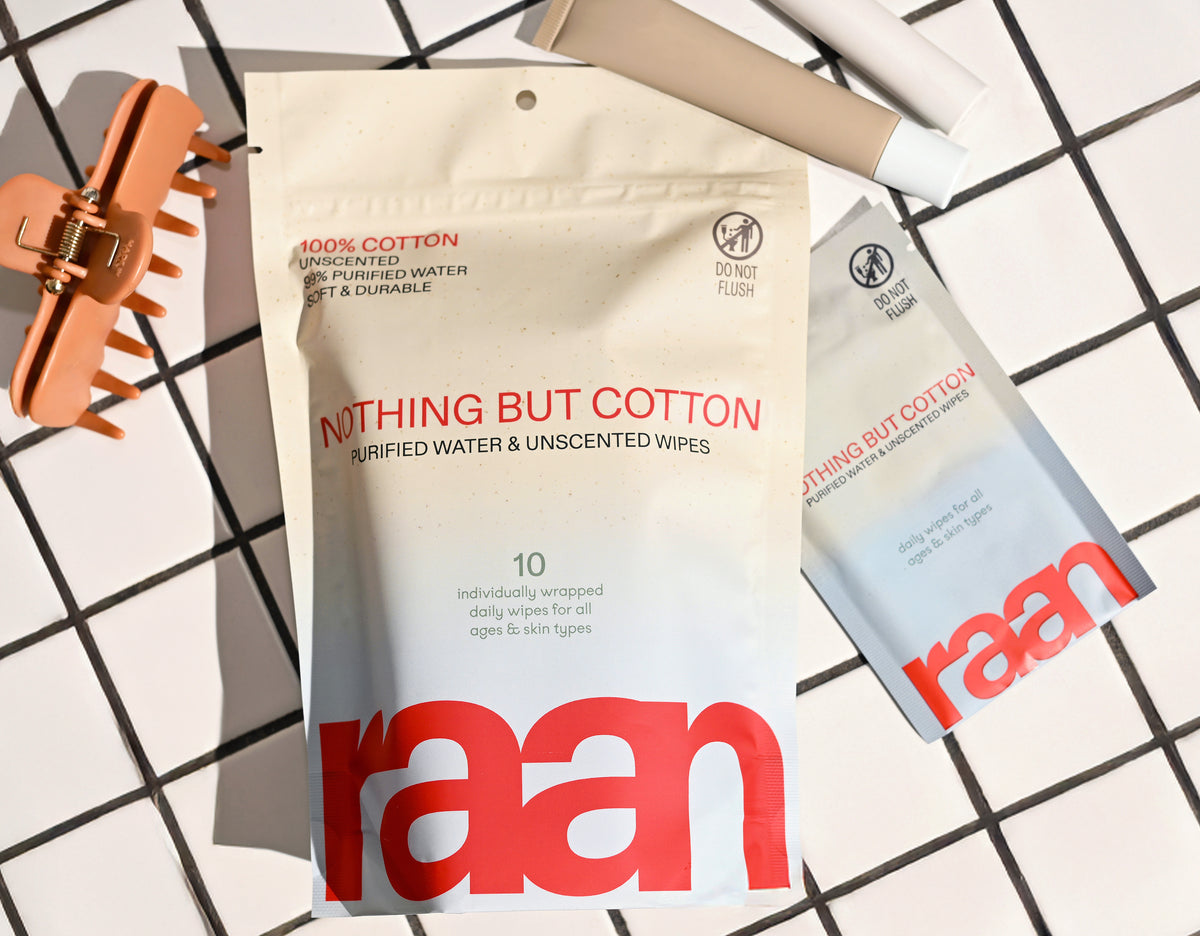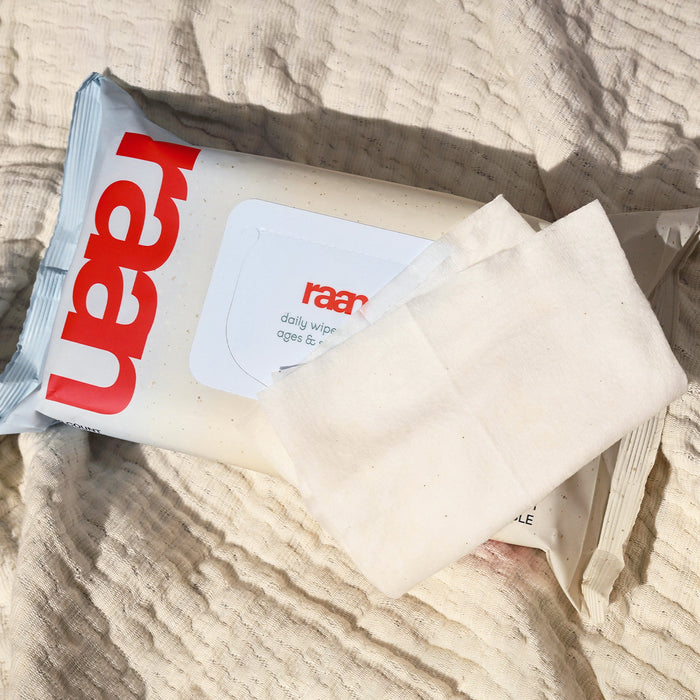Key Takeaways
- Choosing the best non-toxic baby wipes should be simple and straightforward for parents.
- Many conventional baby wipes contain plastic fibers, synthetic preservatives, and fragrances.
- These common ingredients can irritate sensitive baby skin and harm the environment.
- Understanding ingredient lists is essential to finding truly safe and gentle baby wipes.
Table of Contents
- Why Non-Toxic Baby Wipes Matter, for Your Family and the Planet
- What Makes a Baby Wipe Truly Non-Toxic? (Ingredient Deep Dive)
- Ingredients to Avoid in Baby Wipes, And Why
- The Raan Standard, How Our Wipes Redefine Non-Toxic
- Non-Toxic Baby Wipes vs. Conventional Wipes: A Practical Comparison
- Navigating Industry Jargon, "Natural," "Organic," "Non-Toxic," and What They Really Mean
- Third-Party Certifications, What to Trust and Why It Matters
- How to Choose the Best Non-Toxic Baby Wipes for Your Family
- Non-Toxic Wipes for Every Mess, Beyond Diaper Duty
- Sustainability Beyond Ingredients, The Full Lifecycle of Non-Toxic Baby Wipes
- Best of the Best, The Top Non-Toxic Baby Wipes for 2025 (Expert Picks & Why)
- Making the Switch to Truly Non-Toxic Baby Care
Best Baby Wipes Non Toxic, The Honest Guide to Truly Safe, Simple Wipes for Everyday Messes
Finding the best baby wipes non toxic shouldn't require a chemistry degree. Yet most parents find themselves squinting at ingredient lists filled with unpronounceable chemicals, wondering what's actually safe for their baby's delicate skin. The truth is, most conventional wipes contain plastic fibers, synthetic preservatives, and fragrances that can irritate sensitive skin and contribute to environmental waste.
Non-toxic baby wipes offer a cleaner alternative, but only if you know what to look for. The difference lies in transparent formulations with minimal, recognizable ingredients and materials that prioritize both safety and function. We'll cut through the marketing claims to help you identify truly safe options for your family's everyday messes.
If you want a truly safe and gentle option, consider the only unbleached, 100% cotton baby wipe for sensitive skin for your daily routines. For on-the-go convenience, the unbleached, 100% cotton pocket wipe for sensitive skin is a smart addition to your diaper bag or purse.
Why Non-Toxic Baby Wipes Matter, for Your Family and the Planet
Baby skin absorbs up to 60% of substances applied to it, significantly higher than adult skin. When you use conventional wipes multiple times daily for diaper changes, face cleaning, and quick cleanups, those ingredients accumulate. Synthetic preservatives, plastic fibers, and chemical fragrances can trigger contact dermatitis, especially in babies with developing skin barriers.
The environmental impact runs deeper than most parents realize. Standard wipes contain 20-40% plastic content, taking 40+ years to break down in landfills. They also shed microplastics during use, which end up in waterways and soil. Switching to plastic-free, biodegradable options reduces this burden while protecting your family from unnecessary chemical exposure.
For new moms dealing with postpartum skin sensitivity or families managing eczema-prone skin, non-toxic baby wipes eliminate common irritants that worsen existing conditions. The peace of mind that comes with knowing exactly what you're putting on your baby's skin, and your own, makes the switch worthwhile.
What Makes a Baby Wipe Truly Non-Toxic? (Ingredient Deep Dive)

True non-toxic status requires two elements: transparent formulation and safe materials. The safest wipes contain 5-7 ingredients maximum, with each serving a clear purpose. Water should comprise 99% of the formula, followed by gentle moisturizers like organic aloe and food-grade preservatives for safety.
Material composition matters equally. Unbleached, 100% cotton provides effective cleaning without plastic microfibers that can irritate skin or harm the environment. Bleached materials often contain dioxin residues, while synthetic blends shed microplastics with every use.
| Non-Toxic Wipe | Conventional Wipe |
|---|---|
| 5-6 ingredients | 12-20+ ingredients |
| 99% purified water | 60-80% water |
| Unbleached cotton | Plastic fiber blend |
| Food-grade preservatives | Synthetic preservatives |
| No fragrance | Synthetic fragrance |
The science of simplicity works because fewer ingredients mean fewer opportunities for adverse reactions. When brands use 20+ ingredients, they're often masking poor base materials or compensating for harsh preservatives with additional chemicals.
Ingredients to Avoid in Baby Wipes, And Why
Several ingredient categories pose unnecessary risks in baby wipes. Parabens (methylparaben, propylparaben) disrupt hormone function and accumulate in tissue. Phthalates often hide under "fragrance" listings and can affect reproductive development. Formaldehyde releasers like DMDM hydantoin and quaternium-15 break down into carcinogenic compounds over time.
Synthetic fragrances deserve special attention because they can contain hundreds of unlisted chemicals. Even "natural fragrance" can trigger sensitivities in babies and adults with reactive skin. PEGs (polyethylene glycols) and sulfates (SLS/SLES) create foam and texture but strip natural skin oils, leading to dryness and irritation.
Label Decoder: Red Flag Ingredients
- Phenoxyethanol, synthetic preservative linked to skin reactions
- Polysorbate 20, emulsifier that can contain 1,4-dioxane
- Benzalkonium chloride, antimicrobial that disrupts skin microbiome
- Propylene glycol, penetration enhancer that increases chemical absorption
- Any "fragrance" or "parfum", umbrella terms hiding multiple chemicals
Quick scanning technique: If the ingredient list takes up more than 3-4 lines of small text, or if you can't pronounce most ingredients, choose a different product. Trustworthy brands keep formulations simple enough to explain each component's purpose.
The Raan Standard, How Our Wipes Redefine Non-Toxic
Raan wipes contain exactly five EWG-verified ingredients: purified water (99%), organic aloe for moisturizing, food-grade sodium benzoate and potassium sorbate for preservation, ethylhexylglycerin for skin conditioning, and citric acid for pH balance. Each ingredient serves a specific function without compromising safety or effectiveness.
Our unbleached, 100% cotton material eliminates plastic fibers entirely while providing superior absorbency and gentleness. The unbleached process preserves cotton's natural properties without introducing chlorine compounds or dioxin residues found in conventional wipes.
Four key certifications validate our approach: EWG Verified confirms ingredient safety, Cruelty Free ensures ethical testing practices, Natural Cotton Seal verifies material purity, and Women Owned reflects our commitment to transparent business practices.
For families who want a convenient way to try these standards, the mess-ready pack offers a practical solution for sampling non-toxic wipes at home or on the go.
Non-Toxic Baby Wipes vs. Conventional Wipes: A Practical Comparison

The difference between best baby wipes non toxic and conventional options extends far beyond marketing claims. When you examine material composition, ingredient transparency, and long-term skin safety, the gap becomes clear, and concerning.
Conventional wipes typically contain 20-40% plastic fibers, synthetic preservatives, and undisclosed fragrance compounds. They're designed for shelf stability and low production costs, not skin health. Non-toxic alternatives like Raan prioritize unbleached, 100% cotton construction with food-grade preservatives and complete ingredient disclosure.
| Feature | Non-Toxic Wipes | Conventional Wipes |
|---|---|---|
| Material Base | 100% cotton, unbleached | Plastic-cotton blend (20-40% synthetic) |
| Ingredient Count | 5-8 disclosed ingredients | 12+ ingredients, many undisclosed |
| Preservative Type | Food-grade sodium benzoate | Synthetic parabens, formaldehyde releasers |
| Biodegradability | Months to 1 year | 40+ years due to plastic content |
| Third-Party Verification | EWG Verified, safety tested | Rarely independently verified |
The practical impact shows up in daily use. Parents report fewer diaper rashes and skin irritation when switching to non-toxic formulations. The unbleached cotton feels gentler yet maintains durability for thorough cleaning, from diaper changes to sticky fingers to adult skincare routines.
For more tips on choosing the right wipes for your baby's skin, see our guide on best baby wipes for sensitive skin.
Navigating Industry Jargon, "Natural," "Organic," "Non-Toxic," and What They Really Mean
Marketing terms in the baby wipe industry operate in a regulatory gray area, creating confusion for parents seeking genuinely safe products. Understanding these distinctions helps you cut through greenwashing and identify truly transparent brands.
"Natural" has no legal definition in personal care products. Brands can use this term even when products contain synthetic preservatives or plastic fibers. "Organic" applies only to specific ingredients, not the entire product, and doesn't guarantee safety or purity of the final formulation.
Red Flag Words to Question:
- "Eco-friendly" without specific material details
- "Gentle formula" with undisclosed ingredients
- "Dermatologist tested" without published results
- "Plant-based" when plastic fibers are still present
"Non-toxic" should mean ingredients pass independent safety screening, but it's often used loosely. Look for third-party verification like EWG Verified status, which requires rigorous ingredient analysis and transparency standards. "Biodegradable" means the product breaks down naturally, but timeframes vary drastically, cotton degrades in months while plastic-blend wipes persist for decades.
The most reliable approach: demand full ingredient disclosure, verify certifications independently, and prioritize brands that explain why each ingredient is included rather than hiding behind vague wellness buzzwords.
Third-Party Certifications, What to Trust and Why It Matters
Independent certifications provide the transparency that regulatory gaps leave behind. These third-party organizations conduct rigorous testing and ongoing monitoring that individual parents can't replicate at home.
EWG Verified represents the gold standard for ingredient safety in personal care products. Products must contain no ingredients of concern, provide full transparency, and follow good manufacturing practices. Only about 2% of baby wipes currently hold this certification, making it a reliable filter for truly safe options.
| Certification | Requirements | What It Guarantees |
|---|---|---|
| EWG Verified | Ingredient safety screening, full disclosure | No ingredients of health concern |
| Cruelty Free | No animal testing on ingredients or finished product | Ethical development practices |
| Natural Cotton Seal | Cotton purity, sustainable sourcing verification | Authentic cotton content, no synthetic blends |
| Women Owned | 51%+ women ownership, independent verification | Transparent business structure |
To verify certifications independently, check the certifying organization's database directly, don't rely solely on package claims. EWG's Skin Deep database allows you to search specific products and view detailed ingredient analysis. This extra step takes minutes but provides confidence that goes far beyond marketing promises.
For a deeper dive into what makes a wipe truly non-toxic, read our article on non toxic baby care standards.
How to Choose the Best Non-Toxic Baby Wipes for Your Family

Selecting the right non-toxic wipes requires matching product characteristics to your specific needs and values. This systematic approach eliminates guesswork and ensures you find wipes that actually work for your daily routines.
Step 1: Prioritize Complete Transparency. Demand full ingredient lists with explanations for each component's purpose. Avoid brands that use terms like "proprietary blend" or list "fragrance" without specifying source compounds. Raan's approach, listing all five ingredients with their specific functions, sets the standard for honest disclosure.
Step 2: Verify Material and Certifications. Confirm the base material is 100% cotton without plastic fibers or bleaching agents. Look for multiple third-party certifications rather than relying on a single claim. The combination of EWG Verified, Cruelty Free, and Natural Cotton Seal provides comprehensive safety assurance.
Quick Compatibility Check:
- Sensitive skin: Maximum 6 ingredients, unbleached cotton
- Environmental priorities: Biodegradable packaging and plastic-free construction
- Certifications: EWG Verified, Cruelty Free, Natural Cotton, Women Owned
For families just starting their non-toxic journey, the starter set is a convenient way to try a variety of safe, gentle wipes at home.
Non-Toxic Wipes for Every Mess, Beyond Diaper Duty
The best baby wipes non toxic formulations excel precisely because they're gentle enough for newborn skin yet effective on everyday messes. This versatility makes them essential for busy families who value simplicity over specialized products.
Unbleached cotton wipes handle adult skincare routines with ease, removing makeup, refreshing skin after workouts, or providing a quick cleanse during travel. The 99% water content maintains skin hydration without leaving residue, while organic aloe soothes rather than strips natural oils.
Smart Storage Tips:
- Keep mini-packs in gym bags, car consoles, and diaper bags
- Store below 77°F to maintain optimal moisture retention
- Reseal packages immediately to prevent drying
- Use within 6 months of opening for best performance
Pet owners discover these wipes work beautifully for quick paw cleaning and coat maintenance without harsh chemicals that could irritate sensitive animal skin. The food-grade preservatives mean you don't worry about residue transfer during pet grooming sessions.
For sensitive skin conditions like eczema or dermatitis, the minimal ingredient profile reduces reaction risk while providing necessary cleansing. Parents report using the same wipes for their toddler's face and their own skincare routine, eliminating the need for multiple products.
For more information on the benefits of cotton-based wipes, check out our post on best cotton wipes.
Sustainability Beyond Ingredients, The Full Lifecycle of Non-Toxic Baby Wipes
True sustainability in baby wipes extends from cotton cultivation through disposal, requiring examination of the complete environmental footprint. Material choice creates the most significant impact, plastic-blend wipes persist in landfills for 40+ years while 100% cotton options biodegrade within months under proper conditions.
Raan's packaging approach demonstrates comprehensive environmental thinking: 70% less plastic than conventional wipe containers, 35% post-consumer waste content in pouches, and 100% recyclable outer boxes. This reduces the packaging footprint by approximately 60% compared to hard-plastic dispensers.
Proper disposal matters significantly. Biodegradable wipes require oxygen-rich environments to break down effectively. Home composting works for cotton-based wipes without synthetic preservatives, but municipal composting facilities handle the process more reliably. Never flush any wipes, even "flushable" ones cause infrastructure problems and environmental contamination.
The unbleached cotton sourcing eliminates chlorine processing chemicals from waterways while supporting regenerative agricultural practices. When every parent switched to plastic-free wipes, we'd eliminate approximately 2.3 million pounds of synthetic microfibers from waste streams annually, a meaningful reduction in persistent environmental pollutants.
For more on the environmental and health effects of ingredients, see this EPA resource on ingredients and human health.
Best of the Best, The Top Non-Toxic Baby Wipes for 2025 (Expert Picks & Why)

After analyzing ingredient transparency, material composition, and third-party certifications, these brands represent the current leaders in truly non-toxic baby wipe formulation. Each offers distinct advantages for different family priorities.
Raan Cotton Wipes - The Complete Transparency Standard
Best for: Families demanding full ingredient disclosure and maximum gentleness
Raan sets the industry benchmark with unbleached, 100% cotton construction and just five EWG-verified ingredients. The 99% purified water base with organic aloe provides effective cleansing without synthetic additives. Multiple certifications, EWG Verified, Cruelty Free, Natural Cotton, Women Owned, demonstrate comprehensive safety and ethical standards.
The 70% plastic reduction in packaging and 35% post-consumer waste content address environmental concerns without compromising product integrity. Parents consistently report reduced skin irritation and appreciate the complete transparency in sourcing and formulation.
WaterWipes - Minimal Formula Approach
Best for: Ultra-sensitive newborn skin and allergy-prone families
- 99.9% water with minimal additives
- Widely available in retail stores
- Consistent moisture retention
- Plastic-blend material construction
- Limited ingredient transparency details
- Higher per-wipe cost
Hello Bello - Accessible Clean Option
Best for: Budget-conscious families seeking cleaner ingredients
- Subscription model convenience
- Plant-based cleaning agents
- Competitive pricing structure
- Contains undisclosed fragrance compounds
- Mixed material composition
- Limited third-party verification
| Brand | Material Base | Key Certifications | Ingredient Count | Unique Advantage |
|---|---|---|---|---|
| Raan | 100% unbleached cotton | EWG Verified, Cruelty Free, Natural Cotton | 5 disclosed | Complete transparency + plastic-free packaging |
| WaterWipes | Plastic-cotton blend | Dermatologist tested | 2 primary | Minimal formula approach |
| Hello Bello | Plant-fiber blend | Hypoallergenic claim | 8+ ingredients | Subscription convenience |
For additional expert picks and a broader overview, see our roundup of the best baby wipes available today.
To learn more about the science behind ingredient safety, visit this peer-reviewed article on baby wipes and skin health.
Making the Switch to Truly Non-Toxic Baby Care
Choosing the best baby wipes non toxic is about more than just avoiding a few ingredients, it's about embracing transparency, simplicity, and real function. By prioritizing unbleached, 100% cotton materials, minimal EWG-verified ingredients, and trusted third-party certifications, you can confidently care for your family's skin and the planet. The right wipes make everyday messes easier, safer, and a little more honest, no guesswork required.
Frequently Asked Questions
What ingredients should I avoid in baby wipes to ensure they are truly non-toxic and safe for my baby's sensitive skin?
Avoid wipes containing plastic fibers, synthetic preservatives, parabens, alcohol, artificial fragrances, and bleach. These ingredients can irritate delicate skin and add unnecessary chemicals. Look for minimal, recognizable ingredients like purified water, food-grade preservatives, and organic aloe for gentle, safe care.
How do non-toxic baby wipes benefit both my baby’s health and the environment compared to conventional wipes?
Non-toxic wipes reduce exposure to irritants and harsh chemicals, supporting sensitive skin health. Environmentally, they avoid plastic fibers and synthetic additives that contribute to pollution and waste. Choosing wipes made from unbleached, 100% cotton and packaged with less plastic helps lower your family’s environmental footprint.
What do labels like "natural," "organic," and "non-toxic" really mean when choosing baby wipes?
These labels can be vague or misleading without context. "Natural" doesn’t always mean safe or simple, and "organic" may not apply to the whole product. "Non-toxic" should mean transparent ingredients with no harmful chemicals. Always check for clear ingredient lists and certifications rather than relying on buzzwords alone.
Why are third-party certifications important when selecting non-toxic baby wipes, and which certifications can I trust?
Third-party certifications provide independent verification that wipes meet strict safety and environmental standards. Trusted certifications like EWG Verified, Natural Cotton Seal, Cruelty Free, and Women Owned ensure transparency and integrity. They help you confidently choose wipes that are genuinely safe and responsibly made.





